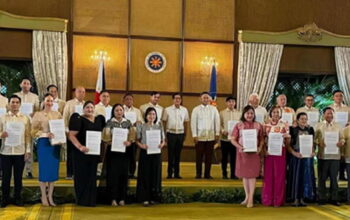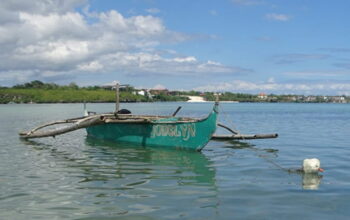
THE price of young coconut (botong) cost P80.00 a piece in Anda; P60.00, somewhere in Loboc; P35-40 in Tagbilaran City; fish prices range from at least P180.00/kilo of used to be “inferior,” (like Tulingan or Bolinao) to P300.00/kilo (always dependent on the weather as excuse); and tricycle fare, which could be considered extortionate, defying the regulated fares. These are but some of the on-going sky-rocketing pricing of commodities and services here.
These make Bohol tagged as most expensive province in terms of prices of basic commodities for poor people to tourism-related services and products for visitors. The prices remain unabated, says a tourist, who asked anonymity. “Dollar kaayo ang Bohol”, said another visitor.
The prevailing situation provoked The Aumentado-Balite administration to reactivate the Municipal Price Coordinating Councils (MPCCs) in the municipalities.
Gov. Aris Aumentado wasted no time in preventing greedy entities from taking advantage of the situation. He issued Memorandum Circular no. 1 on Jan. 1, urging the towns’ officials to reactivate their Municipal Price Coordinating Councils (MPCCs), apparently to eliminate the excessive price increases of basic commodities and prime commodities, especially fish prices, according to press release of the Capitol.
The directive is based on Joint Memorandum Circular (JMC) No. 3, series of 2020 issued by the Department of Agriculture (DA), the Department of Trade and Industry (DTI), Department of Health (DoH), Department of Environment and Natural Resources (DENR) and Department of Interior and Local Government (DILG), strengthening the role of Local Price Coordinating Councils (LPCCs). JMC No. 3 is in accordance with Article 2 of Republic Act No. 7394, or the Consumer Act of the Philippines and Republic Act No. 7581, or the Price Act.
Through the memorandum, MPCCs will be reactivated and strengthened, can recommend suggested retail prices (SRPs), analyze market price changes, establish a task force, and initiate legal action against violators.
In a meeting held on Jan. 29, Gov. Aumentado, along with the Task Force Isda members, observed that the initiatives of the MPCCs constitute an effective method of addressing the continuing issue regarding fish prices. He emphasized that monitoring the prices of goods requires a collective effort from all LGUs through a “whole-of-province approach.”
The governor also tasked Provincial Legal Officer Handel Lagunay to develop a template for an executive order for mayors to reactivate their respective councils.
In an interview, Lagunay said the monitoring reports from LGUs will determine if their MPCC has been reactivated based on the released JMC. “Ma-monitor, matan-aw ug ma-pangumusta, kay naa may regular reporting,” he expounded. Lagunay also highlighted the crucial role and composition of MPCC members in efficiently implementing its functions.
“It is the discretion of the mayor kung kinsa ang iyang gisaligan ug gitan-aw nga angayan pud nga mabutang (sa council). Ang pinaka-importante gyud nila nga mahimo (MPCCs) is price monitoring ug maka-recommend ug reasonable SRPs.”
Lagunay also expounded on further initiatives of the provincial government to attain food security in Bohol as envisioned in the strategic change agenda of the Aumentado-Balite administration.
“Naa atoang Fish Buy Back Program, ang pagpa-increase sa fish production nato aron mubarato ang presyo sa atong isda,” he underscored.
Present during the meeting were executive assistant for fisheries Al Piloton, provincial administrator Asteria Caberte, chief of staff Atty. Filipina Asoy-Piollo, Bohol Provincial Environment Management Office head Jovencia Ganub, newly-confirmed Provincial Cooperative Development Office officer Ma Conrada Fuentes, executive assistant for agriculture Ricardo Oblena, Salvio Madanguit, and Gil Bongato. (rvo w/ Capitol PR)



